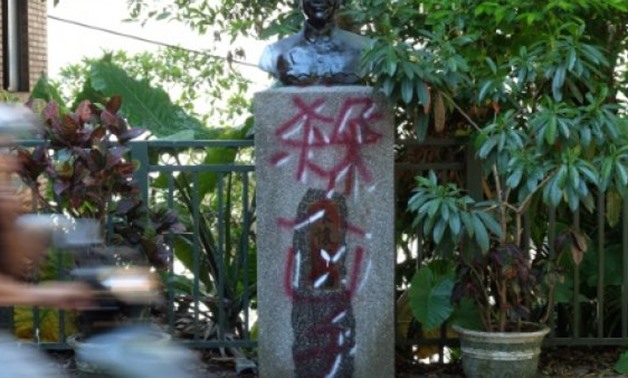
© AFP / by Michelle YUN | A statue of Taiwan's Chiang Kai-shek defaced with the word "murderer"
TAIPEI - 6 December 2017: Tributes to Taiwan's former dictator Chiang Kai-shek will be removed across the island after lawmakers voted in favour of the mandatory axing of symbols of its authoritarian past.
The so-called "transitional justice" bill, which was passed late Tuesday, means that streets and schools will be renamed and statues taken down.
It also paves the way for a full investigation into Chiang's "White Terror" -- a purge of his political opponents between 1947 and his death in 1975.
Campaigners have long called for the names of unjustly jailed or executed victims to be cleared and perpetrators exposed.
The bill said that authoritarian rule should be "stripped of legitimacy" as it violated freedom and democracy.
"For this purpose, institutions, schools, public buildings and spaces should be prohibited from displaying any commemorative symbols of authoritarian rule," it said.
"Related symbols and signs should also be removed, renamed, or otherwise disposed of."
President Tsai Ing-wen is expected to ratify the bill within the next two weeks.
Public statues of Chiang are regularly attacked and hundreds now lie discarded in the grounds of his mausoleum outside Taipei.
Since Tsai's opposition Democratic Progressive Party (DPP) took the leadership and a majority in parliament from the Kuomintang (KMT) in elections in 2016, it has targeted Chiang's legacy.
Earlier this year it announced a hall in memory of the dictator -- one of Taipei's most recongisable landmarks -- would stop selling souvenirs depicting him, while references to him would be removed from its galleries.
That move came on the 70th anniversary of a 1947 massacre which is estimated to have killed 28,000 people and was the prelude to the "White Terror" crackdown.
Chiang's public profile was also steadily eroded when the DPP first ruled the island from 2000-2008, including the renaming of the island's main airport and his image being scrapped from bank notes.
The new bill is the first time removal of authoritarian symbols has been made compulsory.
Chiang fled to Taiwan and ruled the island under martial law after his nationalist Kuomintang (KMT) troops lost a civil war in 1949 to the Communists on the mainland.
Although still revered by some as a hero for taking on Communist forces and fighting the Japanese during the Second World War, others see him as a stain on the history of the now fully fledged democracy.
As part of the bill, parties must declare all political files they have dating between 1945 and 1992 and could be ordered to hand them over to national archives, as part of a probe into Chiang's rule.
The DPP described the bill as a "bridge of reconciliation" that would be a "comfort and compensation" to victims and their families.
But the KMT blasted the bill as unconstitutional, saying it gave the DPP an excuse to meddle in the judicial system.
Parliament last year also passed a bill to investigate and seize ill-gotten assets from all parties, although it is only the KMT which has faced questions about its trove, leading to accusations of a witchhunt.
Comments
Leave a Comment